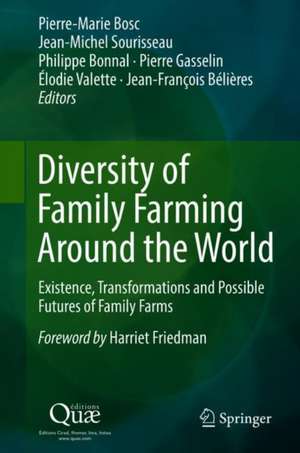Diversity of Family Farming Around the World: Existence, Transformations and Possible Futures of Family Farms
Editat de Pierre-Marie Bosc, Jean-Michel Sourisseau, Philippe Bonnal, Pierre Gasselin, Élodie Valette, Jean-François Bélièresen Limba Engleză Hardback – 21 ian 2019
Preț: 1118.62 lei
Preț vechi: 1364.17 lei
-18% Nou
Puncte Express: 1678
Preț estimativ în valută:
214.04€ • 224.08$ • 177.11£
214.04€ • 224.08$ • 177.11£
Carte disponibilă
Livrare economică 15-29 martie
Preluare comenzi: 021 569.72.76
Specificații
ISBN-13: 9789402416169
ISBN-10: 9402416161
Pagini: 341
Ilustrații: XX, 341 p. 53 illus., 2 illus. in color.
Dimensiuni: 155 x 235 mm
Greutate: 0.73 kg
Ediția:1st ed. 2018
Editura: SPRINGER NETHERLANDS
Colecția Springer
Locul publicării:Dordrecht, Netherlands
ISBN-10: 9402416161
Pagini: 341
Ilustrații: XX, 341 p. 53 illus., 2 illus. in color.
Dimensiuni: 155 x 235 mm
Greutate: 0.73 kg
Ediția:1st ed. 2018
Editura: SPRINGER NETHERLANDS
Colecția Springer
Locul publicării:Dordrecht, Netherlands
Cuprins
Foreword.- Introduction.- Non-Market rationales, an ‘archaism’ worth revisiting.- Introduction.- Family farming in Polish Podlasie: anachronism or overlooked potential?.- Urban and peri-urban agriculture: dairy farms in Cairo, Egypt.- Integration into international markets of family cotton farms in Mali.- The fragility of the sedentarization of a pastoral Fula population in Benin.- Local anchoring and migration as two faces of the same coin.- Introduction.- Diversified multi-localized family farming in Nicaragua.- The iony moment and the Indian farmers of Ecuador.- Agriculture in southern Mozambique: an activity based on migrations for work.- At the limits of family agriculture: family business forms of production?.- Introduction.- Between firms and family business farms: small transitory family plantations in Indonesia.- Family farming in Brazil, modernized and integrated.- Agricultural family enterprises, territories and politics in Argentina.- Diversification of activities between strategies of survival and accumulation.- Introduction.- Family farming confronted by drought and liberalization in Senegal.- Long-term accumulation strategies and family farms in Cameroon.- The uncertain market integration of family farms in Madagascar.- Organization of family in between a collective asset and the limitations of individual strategies.- Introduction.- From the big to the small family in Burkina Faso: disrupted generations and statuses.- A family and its system of pastoral farming without borders, between Niger, Chad and Nigeria.- Beyond family farming: determining political and territorial issues.- Introduction.- Fragmentation of irrigated family farms in southern India.- On the roof of the world, the pastoralists of the Tibetan plateau confronted by change.- Family agriculture in contemporary Kanak society.- Conclusion: Methodological and conceptual contributions.- References.- List of authors.
Notă biografică
Editors of this work are Bosc, Pierre-Marie; Sourisseau, Jean-Michel; Bonnal, Philippe; Gasselin, Pierre; Valette, Elodie; Bélières, Jean-François
Textul de pe ultima copertă
In contemporary times where farming models are challenged through deep transformations of agricultural organizations and markets, this books proposes a new visit of the diversity of family forms of production to explore their current transformations all over the world. By adopting a comprehensive perspective it allows bringing together several dimensions often studied separately: linkages with markets, territorial development, labour mobility through migrations and livelihood strategies, farms’ autonomy, and food security, as well as the many ways of collective action and the role of public policies.
The book relies on 18 case studies in the five continents. All were driven with a single and original methodological framework, inspired by the Sustainable Rural Livelihoods. The SRL initial framework was reshaped and adapted to allow each author to fine-tune “what makes family”, to understand family labour adaptations to their environment, and to align them with territorial dynamicsand public policies in each national situation.
Co-written by a network of researchers, this book deepens scientific knowledge on family farming around the world, and at the same time it contributes to test and improve a methodological framework adapted to analyse and of observe rural dynamics.
It is dedicated to researchers, teachers and students, agronomists, economists, geographers, sociologists and historians but also experts and practitioners in agricultural and rural development. More widely, NGOs and any citizen willing to understand the family farming’s issues in different social contexts, should also find interest in reading it.
The book relies on 18 case studies in the five continents. All were driven with a single and original methodological framework, inspired by the Sustainable Rural Livelihoods. The SRL initial framework was reshaped and adapted to allow each author to fine-tune “what makes family”, to understand family labour adaptations to their environment, and to align them with territorial dynamicsand public policies in each national situation.
Co-written by a network of researchers, this book deepens scientific knowledge on family farming around the world, and at the same time it contributes to test and improve a methodological framework adapted to analyse and of observe rural dynamics.
It is dedicated to researchers, teachers and students, agronomists, economists, geographers, sociologists and historians but also experts and practitioners in agricultural and rural development. More widely, NGOs and any citizen willing to understand the family farming’s issues in different social contexts, should also find interest in reading it.
Caracteristici
The diversity of local and national family farming situations, studied with a single methodological frame gives sense to the family-based farming choice for the future An original adaptation and a challenging test of the widely used sustainable rural livelihood framework A wide participation of authors from academic and development bodies
